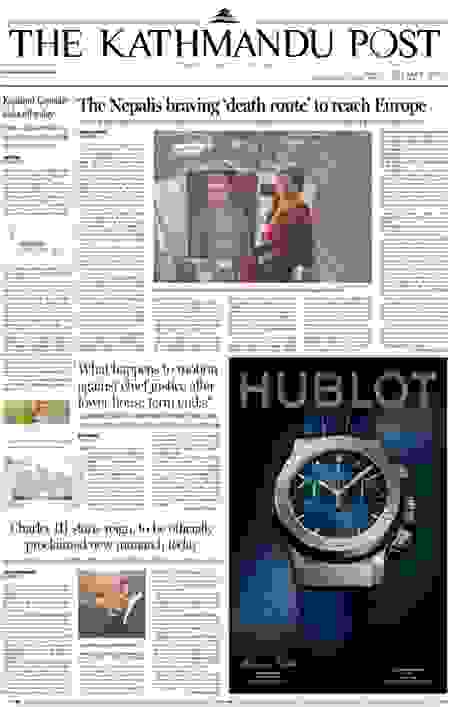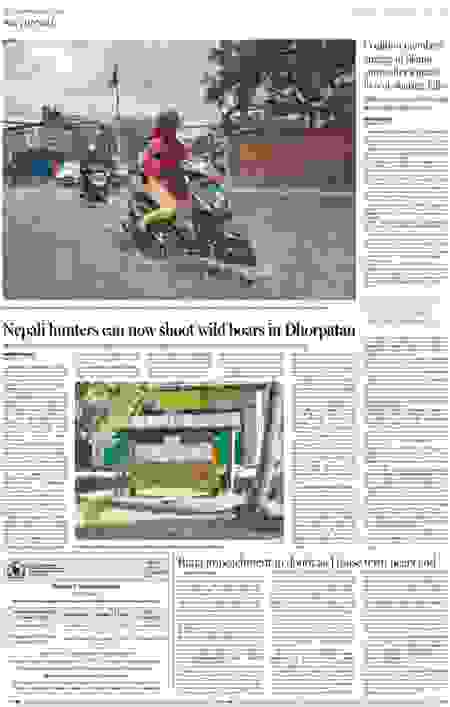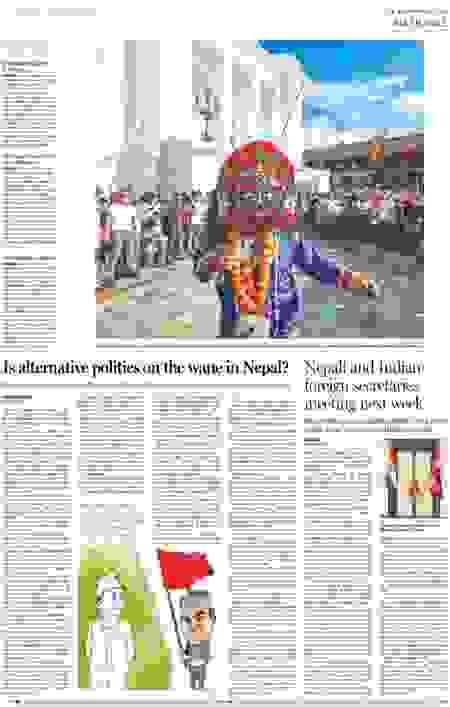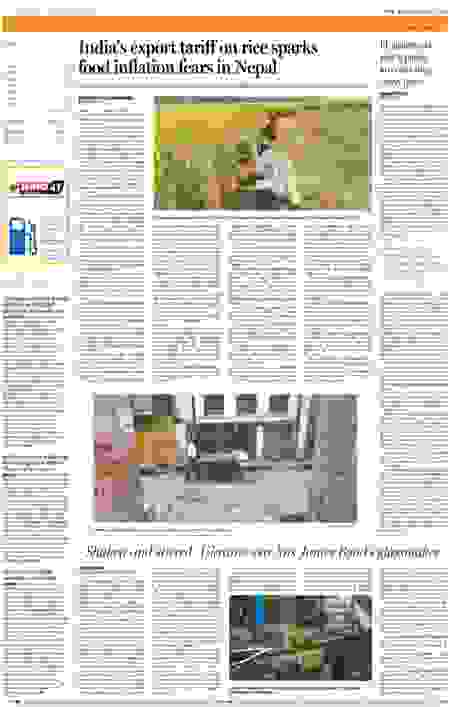The Nepalis braving ‘death route’ to reach Europe

Yamkala Tiwari holds a photo of her son Nabin Tiwari. Nabin left for Turkey in 2017, and the family hasn’t heard from him since. Post Photo: Janakraj Sapkota
KATHMANDU : “I won’t come online tonight and will call only after ten days. Tell aama [mother] that and not to worry.”
The Chhipchhipe settlement lies about 8km north of Kawasoti bazar along the east-west highway in Nawalparasi, right at the base of the Chure hills. In a small, zinc-roofed abode in this settlement live Yamkala Tiwari and her elder son Dipendra. Yamkala’s younger son, Nabin, had left for Turkey, five years ago, with dreams of making it big in Europe. Dipendra had passed Yamkala the message Nabin left at about 9pm on December 5, 2017.
Ten days passed but Nabin’s promised call didn’t come. It never did.
Nabin, aged 24, had left the country on November 1, 2017, aiming for Greece via Turkey, with a work visa. After 24 days, he had notified Dipendra of his arrival in Istanbul, the Turkish capital.
Five days later, Nabin was part of the group that was aiming for Greece. This the family knows but not much beyond. For the past five years, Yamkala has been waiting for her son’s return, with sad eyes and a dejected mien.
Those who try to reach Greece via Turkey have to brave the Evros River and the Mediterranean Sea. Those who don’t want to cross them on congested boats, overburdened with hopefuls, have to opt for the 203km long hiking route through a jungle.
Nabin and his team chose the latter route, the family has learnt through enquiries and from men on the group, including Moti Gurung, from Ilam, Rohit Gurung, and Tikaram Bhattarai, who is also from Kawasoti.
In a Facebook Messenger conversation on July 25, 2018, Moti had said that they walked for seven nights and eight days through the dense forests with little to no food, and that Nabin had fallen sick en route.
“The agent left Nabin with an unknown man in the jungle and led us forward,” Moti said from Greece. “I don’t know what happened after that.”
Moti is out of contact since then and his Facebook account hasn’t been updated since March, 2020.
With Nabin’s whereabouts unknown, Dipendra contacted a man called Mohammed, who was responsible for taking the group to Greece via Turkey, through the social networking app Imo. Mohammed said that Nabin had had his legs swollen and was also suffering from fever; hence he was admitted to a hospital. Mohammed, however, didn’t reveal the name and location of the hospital where Nabin was said to be undergoing treatment. Neither do Nabin’s teammates headed for Greece know of it.
The family got in touch with Moti after seven months of Nabin’s disappearance. Moti had already reached Greece by then and was just released after spending 25 days in police custody. In two Messenger conversations on July 2 and 8, 2018, Moti said that he had left for Greece from Istanbul at midnight with four Nepalis, three Pakistanis, an agent, and one man who showed the way through the jungle.
Yamkala gets overcome with emotions thinking of the times she spent with her younger son. “After my son disappeared, I have lost count of days and nights,” she says. “Now I don’t know whether to live or to die.”
Uncounted deaths, few complaints Many Nepalis who get to Turkey, lured by organised human traffickers and after spending Rs1.1-1.5 millions, have just one goal in mind—to reach Greece anyhow. But even if they reach Greece, a developed country that is a member of the European Union, their odyssey hardly ends.
According to the research paper ‘Transborder Crime Between Turkey and Greece: Human Smuggling and Its Regional Consequences’ by Professor Ahmet İçduygu at Koc University, of the total people who enter Greece via Turkey, 14 percent head for the United Kingdom, 13 percent Germany, six percent Italy, five percent France, and 13 percent Greece itself.
Deputy Inspector General Tek Prasad Rai, who is former chief at Nepal Police’s Anti-Human Trafficking Bureau, also says that for most Nepalis, Greece is a transit point to enter other European countries.
Rohit Gurung, who accompanied Nabin and Moti, told the family in a Facebook Messenger conversation on July 18, 2018 that many Nepalis in his team have already reached either Portugal, Italy or Spain. He said that he was working at a hotel in Greece where he earned USD10 per day, which didn’t suffice him for food and lodging. “This is the situation of 75 percent of Nepalis who have come to Greece,” Rohit said. In another conversation on December 25, 2019, Rohit had spoken from Portugal.
Nepal’s police and other government agencies do not have an exact data of the number of Nepalis who reach Turkey on work visa and then head for Greece, illegally, by paying hefty sums to organised traffickers.
DIG Rai said that though the number of Nepalis who meet with accidents on their way to Greece is large, the victims’ families do not inform the police, the reason why data on trafficked individuals is scarce.
Like Rai said, Yamkala hasn’t filed a report about her disappeared son to any government agency. Because her own relatives orchestrated Nabin’s trip in the beginning, Yamkala is hesitant to seek government help.
“Even though we get information informally, the victim’s family do not file a formal complaint with police,” Rai said. “The victim’s own relatives are connected in most of these cases of organised trafficking.”
According to Yamkala, it was Nabin’s own brother-in-law, Tulasi Prasad Neupane, a resident of Butwal who initiated the process to send him to Turkey. Neupane had worked in Saudi Arabia for over a decade, so Yamkala was assured that he had the know-how of foreign trips. Recalling the conversation with Neupane the day Nabin left, Yamkala said, “He [Neupane] said Nabin would land a job that would pay Rs30,000 a month. And if he gets a part-time gig, the income would increase. It never crossed my mind that he would disappear.”
According to the Missing Migrants Project of the International Organisation for Migration, within the first five months of 2022, as many as 21 migrants have died in the Turkey-Greece border area.
In January and February of 2021, ten migrants were found dead in the same area.
The agents do not allow those illegal migrants to keep any identifying document or cellphones with them, the reason why officials are unable to ascertain the nationality of those dead or deranged migrants.
On February 3, officials at the Greece-Turkey border nabbed 50 migrants from Nepal, Pakistan and some other African countries trying to cross to the other side. The arrested migrants were kept at the detention centre and asked to take off their shoes and undress. They were then ordered to return to the Turkish territory on foot. The news that as many as 19 of those migrants died on the way, succumbing to the freezing cold amid snowfall, made international headlines.
Ujjwal Kumar Ghising, chair of Immigrant Nepalis Association in Turkey, said that while he knew that at least eight Nepalis were among those who battled snowfall and freezing cold, he couldn’t know whether they were among the deceased.
The news of the mass death of migrants which spread around the world shocked the family of Divyadev Awasthi in Nepal’s Baitadi. It was around the same time when Divyadev had headed for Greece through the illegal route via Istanbul. Birendra Raj Joshi, Divyadev’s brother-in-law, said that he was further perturbed upon learning that only seven of the eight-member team returned to Turkey. Divyadev has been out of contact since January 31, according to Joshi. “We are desperate to know the whereabouts of Divya, but have had no luck so far,” Joshi said.
Wondering if Divya’s name is included in the list of dead migrants, his family has filed a report at the Ministry of Foreign Affairs’ consular department and at Nepal Police’s Anti-Human Trafficking Bureau. Rai, the former chief of the bureau, said that though a correspondence has been made with Interpol, Divya’s whereabouts are unknown.
Nearly a year ago, on November 11, a vehicle carrying migrants crashed at a border area, 502km east of the Greek capital Athens. As many as seven passengers died in the incident.
Upon learning of the incident, the families of Nepali migrants renewed the search for their dear ones. After they contacted the bureau, it procured the images of those who died in that fatal crash with Interpol’s help.
Forty days after the incident, the relatives identified the deceased—30-year-old Raju Lama from Dolakha’s Bhimeshwar Municipality; 21-year-old Ramila Ghale, also known as Sharmila, from Rasuwa’s Amachhodingmo Rural Municipality; Laxman Sapkota, 38, from Kailali’s Gauriganga Municipality; and Om Bahadur Thapa from Tanahun’s Ghiring Rural Municipality.
Among the dead, Laxman and Raju had reached Turkey via Dubai on a work visa. Sharmila, from a rural village in Rasuwa, had reached Iraq when she was just 19. Om Bahadur had reached Turkey via Dubai with the help of human traffickers.
Lokraj Acharya, a native of Kailali who was injured in the incident, said that they had reached the border area after a 13-day walk through the jungles. The vehicle they were on crashed while trying to cross to the other side of the border, into Greece. Acharya, who is now in Greece, said he is neither happy with his work nor his remuneration.
Not what they sought
According to the families concerned, one person spends an average of Rs1-1.5 million to land in Turkey. The amount includes ‘agent charge’, flight ticket fare, and food and lodging.
But the charge could be more. For instance, Rohit, who left Nepal with Nabin, could head for Greece only after paying an extra $2,900 to one Ashish Ghimire, an agent, and with the help of a Pakistani agent.
The illegal route to Greece is so arduous that the travellers not only risk torture and accidents but also get arrested by security officials and are even taken hostage. In one instance, on April 4, the Turkish police arrested as many as 37 Greece-bound Nepalis held at a house in Istanbul.
A few weeks later, on April 26, it was discovered that four Nepalis—two men and women—were held hostage by six armed Pakistani nationals in Taksim Square, Istanbul. The Nepalis had known the Pakistani nationals as agents who would take them to Greece. Acting on a tip-off, the Turkish police had set the Nepalis free andarrested one of the hostage-takers.
According to a translator who worked for four months in 2016 and 2017 at the Moria Camp, one of Greece’s biggest refugee camps, a majority of Nepalis reach Greece through human traffickers.
“The agents would lead them off as early as three in the morning,” the translator, who wished to remain anonymous, said. “They are made to travel on small, congested boats teeming with people.” While applying for a refugee certificate with Greek authorities, the translator added, they claim that they faced brutality during the Maoist insurgency or caste-based violence back home in Nepal, so they couldn’t return.
According to Nepal Police’s Metropolitan Crime Division, it received a total of 37 complaints from Nepalis trafficked to Turkey in the fiscal year 2017-18. In 2019-20, however, only one complaint was filed; it stated an agent had swindled Rs3.9 million off the complainant, promising them to take to Turkey. The following fiscal year, the number of complaints was four. All four said they had paid Rs2.25 million each to the agents.
Superintendent of Police Krishna Koirala, who is the spokesperson of the division, said that though the number of trafficked Nepalis is large, few do actually file a complaint.
At the Anti-Human Trafficking Bureau, however, only one such complaint has been filed. It was filed by one ‘Babarmahal 61’ (the name changed by police to protect the complainant’s identity), who registered the complaint on February 17, 2021, saying she and her daughter were left stranded in Turkey by agents under the pretext of providing them lucrative jobs.
A man called Anil Dangol had put Babarmahal 61, who runs a clothing store at Budhanilakantha in Kathmandu, in touch with one Januka Lama. Januka had said that she’d provide both the mother and daughter jobs that’d pay Rs80-90,000 per month. The mother-daughter duo then met Purnima Basnet, who runs a clinic at Gongabu, for health checkup and visa processing. Purnima then put them in contact with Kismat Singh, alias Lucky Singh, who, she said, was his father. The duo sold their land in Tokha and paid Purnima Rs800,000.
The duo reached Turkey on October 8, 2020. For three months after that, Lucky kept them in a “hostage-like situation,” promising them jobs. Then one day, Lucky whisked the mother away to the border area, saying it was for employment, while leaving the daughter in her room.
At that time, the daughter managed to get in contact with the Association of Nepali Immigrants in Turkey. With the association’s help, she managed to return to Nepal on November 23, 2020. For the mother, however, Lucky assured that she’d get to Greece and led her through the jungle. In her police statement, Babarmahal 61 has said, “While walking through the jungle, I saw a dead Pakistani and then I cried that I’d rather die but wouldn’t move ahead. After that, Lucky brought me back home.”
According to her statement to police, Lucky was ready to bring her back only after she promised in writing that she wouldn’t file a case against Purnima and Januka once she was back home. But after returning, the duo did file a case with the police stating they were swindled and lost about Rs2 million.
Based on the complaint, police nabbed Jivan Bhatta, an agent, from Tarakeshwar, and Purnima Basnet from Machhapokhari. On March 31, 2021, the Kathmandu District Court released Bhatta, the main defendant, on a bail of Rs300,000 and sent Basnet to custody for investigation. The police are trying to issue a red corner notice through Interpol to nab the other defendant, Lucky Singh.
According to Anti-Human Trafficking Bureau, the organised racket that trafficks Nepalis to the US and European countries like Greece, Turkey, Croatia, and Romania is still very active in Nepal. These traffickers work under Indian and Pakistani racketeers, officials at the bureau said. Nepalis who try to reach Greece via Turkey, however, aim to stay in Greece if they get a decent job and if not, head for Portugal.
According to the bureau, in the last two years, as many as 150 Nepalis trafficked to the US were rescued and brought back home. But only three of them have filed a complaint with the police.
Tapas Adhikari, who has been Nepal’s ambassador to Greece and Turkey and is now resident ambassador to Pakistan, also says that only two such cases have come to his notice in the last year and a half.
“Those two cases were about the deaths of Nepalis in Turkey after their work visa expired,” Adhikari said.
Adhikari added that according to the Embassy’s correspondence with the Turkish government, no Nepalis were among the dead in the latest road accident that killed migrants.
But despite the fact that incidents of deaths, disappearances, and accidents among illegal travellers are increasingly being reported, Nepalis haven’t stopped trying to get to Greece via Turkey, and spending millions for it.

Divyadev Awasthi in Istanbul, Turkey. Awasthi had headed for Greece through the illegal route via Istanbul. He has been out of contact since January 31.Photo courtesy: Awasthi’s facebook

Yamkala Tiwari at her home in Kawasoti.Post Photo: janak raj sapkota

Nabin Tiwari with a friend in Istanbul. While living in Nepal, Nabin worked as a videographer.Photo courtesy: Tiwari’s facebook























